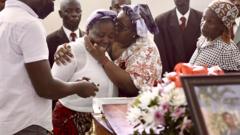In Mozambique’s capital, Maputo, a group of mourners gathered in a cemetery, their faces marked by an unsettling youthfulness as they honored the memory of Antonio Juaqim, a 16-year-old shot dead during a protest against the presidential election results. Antonio's uncle, Manuel Samuel, shared the tragic details, stating that his nephew was shot in the mouth and the bullet exited through the back of his head. According to Mr. Samuel, CCTV footage from local shops captured police shooting at demonstrators.
The unrest began following Frelimo, the ruling party that has maintained power since independence 49 years ago, being declared the winner of last month’s presidential election, with allegations of vote-rigging by the opposition. Daniel Chapo, the Frelimo candidate, reportedly received 71% of the votes, while his closest competitor, independent candidate Venâncio Mondlane, received just 20%. Mondlane, who alleged electoral fraud and subsequently fled the country, has inspired nightly protests, prompting residents to bang pots and pans at 9 PM local time as a form of dissent.
The protests escalated dramatically on November 15 but ended tragically with multiple casualties, including Antonio. Many demonstrators have since retreated to their homes, where the sound of pots banging becomes a nightly reminder of their displeasure. At Antonio’s funeral, a friend shared a heartfelt eulogy from his mother, lamenting the brilliant life cut short by violence.
Tragic reports from the morgue revealed six bodies of young children, a pointed reminder of the violence affecting Mozambique's youth, with Human Rights Watch highlighting that approximately 40 people have died since the protests began, including at least 10 children. While police commander Bernadino Raphael offered condolences to the families of victims, he deflected blame onto Mondlane's following, accusing them of using children as shields during the unrest.
Opposition leaders like Albino Forquilha spoke out against the police's excessive force, suggesting that authorities prioritize protecting the ruling party over public safety. Security analyst Borges Nhamirre noted the unprecedented scale of violence and property damage in Mozambique's history of protests, specifically among the youth who are now prioritizing a different form of independence focused on economic stability.
Despite Chapo’s claims of a fair election, calls for accountability and governmental reform are growing louder, creating a precarious atmosphere filled with uncertainty and grief. The haunting moment was further echoed by the loss of another young life, 20-year-old Alito Momad, during the protests, cementing a grim narrative of lost futures and unyielding determination for justice amidst Mozambique’s most turbulent political climate in recent decades.




















